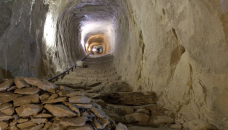From Wikipedia, the free encyclopedia

Chufut-Kale
Historic settlement in Crimea, Disputed between Russia and UkraineChufut-Kale (Tatar pronunciation: [tʃuˈfut qaˈle]; Russian and Ukrainian: Чуфут-Кале - Chufut-Kale; Crimean Tatar: Çufut Qale; Karaim: Къале - Qale) is a medieval city-fortress in the Crimean Mountains that now lies in ruins. It is a national monument of Crimean Karaites culture just 3 km (1.9 mi) east of Bakhchisaray.
Its name is Crimean Tatar and Turkish for "Jewish Fortress" (çufut/çıfıt - Jew, qale/kale - fortress), while Crimean Karaites refer to it simply as "Fortress", considering the place as historical center for the Crimean Karaite community. In the Middle Ages the fortress was known as Qırq Yer (Place of Forty) and as Karaites to which sect the greater part of its inhabitants belong, Sela' ha-Yehudim (The Rock of the Jews).
Name versions
Чуфут-Кале (Russian transliteration: Chufut Kale) is mentioned in the Soviet scientific literature, as well as in the works of Karaite authors in the Russian language from the second half of the 19th century to the post-Soviet epoch, including Seraya Shapshal's publications; Juft Qale [Джуфт Кале] is used by modern Crimean Karaite leaders, arguing that this is the original name of the town (in translation from Turkic - Double fortress), that over time it evolved into "a wrong but more easily pronounced name: Chufut-Kale [Чуфут Кале] or Chuft-Kale [Чуфт Кале]"; Qırq Yer, Qırq Or, Kyrk-Or, Gevher Kermen Çufut-Qale, Çıfut-Qalesi were the Crimean Tatar names during the Crimean Khanate; Kale (Karaim: קלעה, къале, kale - fortress); Sela Yuhudim (Hebrew: סלע יהודים - «Rock of the Jews" (in the Karaite...
Read more at Wikipedia
Reviews (0)








